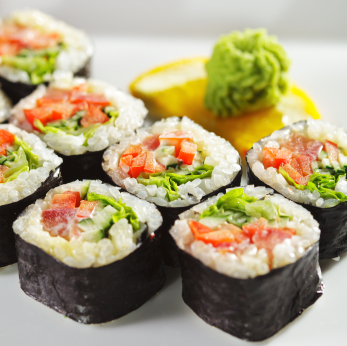Monday, March 25, 2013
Sushi Health Benefits for People Who Love to Eat
Many people who love to eat have often bemoaned the fact that just about everything that tastes good is either fattening or unhealthy. Actually there is a whole selection of tasty food that is not loaded with transfat, sugar and cholesterol. Those who want to indulge their taste buds need only to compare sushi health benefits with the hotdogs and burgers consumed by millions daily to see that indeed there is an alternative for people who want to eat well but eat healthy.
Analyzing Sushi
Sushi consists of protein with omega 3 packed in seaweed and rice. The staple ingredient of sushi is short grain white rice flavored with rice vinegar, salt and sugar. Once cooked, the rice itself is more than 50 per cent water and each 100 grams contains 28.7 grams of carbohydrate, 5.2 grams of fat, and 2.4 grams of protein for a total of 130 calories.
Different types of sushi would have different nutritional and caloric contents depending on the fillings used. A standard California roll, for example, would contain 7 grams of fat, 38 grams of carbohydrates, 5.8 grams of fiber, and 9 grams of protein. The entire roll would be an estimated 255 calories.
A tuna roll is estimated to be around 190 calories with 2 grams of fat, 27 grams of carbohydrate, 3.5 grams of fiber and 24 grams of protein. An avocado roll would contain approximately 28 grams of carbohydrates, 5.5 grams of fiber, and 5.8 grams of fat and 2.1 grams of protein. This roll would have only an estimated 140 calories making it very low calorie indeed. A yellowtail roll would have 245 calories but would also have only 2.6 grams of fat, 37 grams of carbohydrates, 1.9 grams fiber and a whopping 24 grams of protein.
Soya, if naturally fermented, has been linked to lowering the incidence of breast cancer and alleviation of menopause. The other ingredients of sushi each have their plus points: ginger is supposed to aid in digestion and helps in fighting bacteria while wasabi also has anti-bacterial properties. Nori, the seaweed sheet used to cover sushi, contains minerals that are normally found in the ocean such as iodine, magnesium, calcium and folic acid. It also contains Vitamin A, B-complex and Vitamin C.
Omega 3 Fats and Sushi
One of the noteworthy sushi health benefits is that it is generally low in saturated fats. In addition, depending on the filling, it can be high in protein. More importantly however, the sushi rolls that have mackerel and sardine contain significantly high amounts of Vitamin E and Omega3 which are vital to the nervous system. Omega3 fats such as DHA are not only good for the brain, they are good for the cardiovascular system since they are known to increase good cholesterol and lower the bad cholesterol in the body. Some studies even show that Omega3 can be linked to preventing or delaying the progress of Alzheimer’s; to maintaining healthy blood sugar levels and alleviating symptoms of depression and arthritis.
Some people look askance at sushi health benefits and do not like to eat sushi because the filling is usually raw. While it is true that raw fish can contain parasites, a precautionary measure that European restaurants take is to freeze the fish at -20 degrees Centigrade for more than 24 hours. This is known to kill nematode parasites. Others are reluctant to eat tuna because of mercury. A precautionary measure in this case would be to eat tuna with smelt roe, freshwater salmon or Atlantic mackerel since studies show these have lower mercury content.
Although diabetics are advised to go slow on the rice and use low-sodium soy sauce when eating sushi, it is still a far healthier choice than burgers, hot dogs or pizza. As a whole, sushi is food that is low on fat and it has good nutritional value. Moreover, it is kinder to the arteries and never has healthy food come in such an attractive package.
Subscribe to:
Post Comments (Atom)


No comments:
Post a Comment